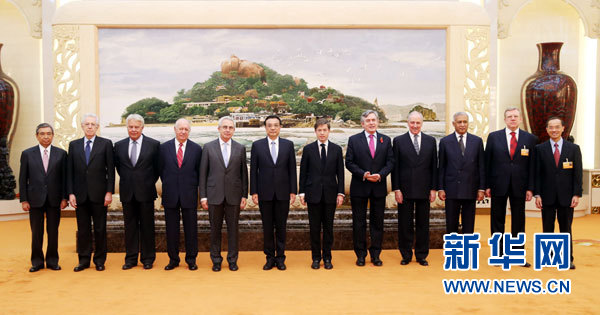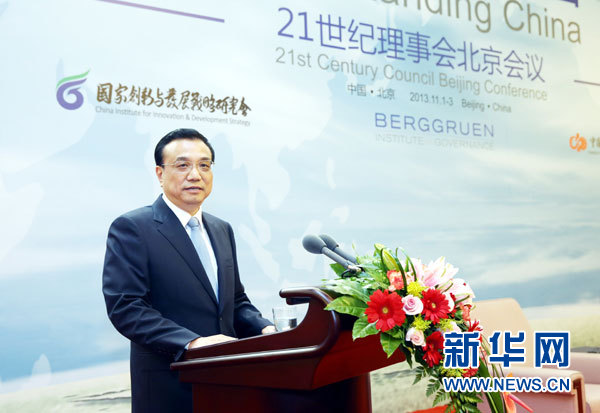- Home Page>Detail
-
Speech by Chinese Premier Li Keqiang at the Opening Ceremony of the 21st Century Council Beijing Conference
Source:CIIDS2015-10-16
Distinguished Guests,
Ladies and Gentlemen, Dear Friends:
Good evening. First of all, I’d like to extend, on behalf of the Chinese government, my heartfelt welcome to all our guests and friends who have come all the way to China to attend this event, and also our warm congratulations on the successful opening of the 21stCentury Council Beijing Conference.
Just prior to this conference, the 21st Century Council sent me a question list which covers a wide range of issues about China, including the development challenges China is now facing, the measures of reform and opening up, and the thoughts and role of China in international governance, just to name a few. It indicates that people hope to know more about China and the role it plays in the international arena. As we know, the theme of this year’s conference is “Understanding China”, a phrase that looks simple but bears profound meaning. I applaud such a theme, as it shows that you are concerned about China and wish to observe China more closely and develop a well-informed understanding of China, especially looking further into the future of China.

I believe it is highly important for the international community to understand China from three major aspects, since China has been acting according to the three principles thus far, and will continue to do so as it marches into the future.
First, China has been considering development and people’s livelihood as a top priority, and sticking to the core task of economic development. The international community indisputably agrees that over the past thirty-odd years, China, a country with more than one billion people, has reduced its poverty-stricken population by more than 600 million according to the World Bank standards, endowing them with the basic right to subsistence and personal dignity. Such accomplishment relies on China’s national development. At present, China is still a medium-income country as measured by the World Bank standards. Still with more than 200 million people stuck in poverty, China should by no means cease its pace of development. As a matter of fact, we have been regarding development as our top priority amid whatever challenges we face over the past thirty years, and successfully realized the average annual economic growth rate of 9.8%. As a reward to these efforts, China has finally earned its hard-won prosperity. On the other side of the coin, a series of underlying conflicts and structural problems have compelled the country to enforce economic restructuring, otherwise its economic development will be hard to sustain. For that purpose, we have further rolled out the strategy of economic structure upgrading, focusing on the quality and effect of development. Meanwhile, as we see people’s livelihood as a matter of primary importance, we have been committed to synchronizing the pace of urban and rural income growth with that of economic development, weaving a solid safety net of social security for our people, and constantly improving people’s living standard and quality. In addition to a better material and spiritual life, our people are also longing for greater social justice. So we are accelerating the institutional improvement with an aim to promote equal right, equal opportunity, equal rules, equal education, equal employment and equal entrepreneurship, and also to promote vertical social mobility, safeguard the development right for every citizen and continuously boost social progress.
Second, we have been firmly adhering to the policy of reform and opening-up, and strengthening the driving force of development as well as market vitality. In retrospect, it was reform and opening-up that unveiled the magnificent chapter of China’s history. We broke away from the rigid planned economic system, pushed forward the market reform, embedded the idea of reform and innovation into every aspect of the national development and progress, and learned from the rest of the world as we blazed the trail of socialism with Chinese characteristics. Our reform efforts have reached a critical stage, and for that reason, we will deepen the reforms in an all-round way, with an emphatic effort to remove the deep-seated problems and advance the structural reform. The reforms that you are concerned about, such as the fiscal, financial, price and enterprise reforms, will all be deepened. At the same time, opening up is also an important engine of national development, as it helps to promote and stimulate the reforms. We have been actively participating in the process of economic globalization by joining in the World Trade Organization and expanding the multi-lateral and regional cooperation in order to integrate the Chinese economy into the world economy. Today, the share of China’s import and export in the world has increased to 10.5% from less than 1% some thirty years ago. Our people have benefited greatly from opening up to the outside world, and that’s why China will make even larger strides in this regard. Recently, China (Shanghai) Pilot Free Trade Zone has been launched with a view to promoting reform and opening up by streamlining administration and delegating power to the lower levels. Such an effort also exhibits the determination and confidence of China in further opening up.
Third, we have been committed to creating a peaceful international environment and stable peripheral environment and achieving mutual benefits and win-win results. The world today is generally peaceful thanks to the secure and stable world order established after the Second World War. Upon the ending of the Cold War, the international community focused even more on development and cooperation. A whole batch of emerging economies rose quickly as the world economy entered the fast track. It was under such a situation that China seized the rare opportunity of development. We cherish it as a beneficiary. However, there is no precedent for China, a large populous country, to draw upon on its way to modernization. Therefore, we are now and will be facing with too many difficulties in this course. It is the common wish of 1.3 billion Chinese people to modernize China, and so we will confront and solve whatever difficulties we face – after all, it could be another contribution we make to the world. But we know, to solve these problems, we need a peaceful international environment and stable peripheral environment. With this in mind, China wishes to continuously consolidate and develop good-neighborly relationship with its surrounding countries, and establish relationship with different types of countries around the world in the hope of making more friends. Holding fast to the principle of mutual benefit, we have carried out cooperation with various countries to the largest extent, creating opportunities and expanding the space of development for each other. China has been and will be upholding peaceful development unswervingly.
Ladies and gentlemen,
The world is undergoing profound changes, with so many opportunities and risks. Our world is also a global village. Different countries are ever more interdependent and closely connected, and people are longing for world peace and stability, economic prosperity and development, and personal happiness and health. Hence, all these interests in common shall be aggregated and constantly magnified. In this process, China will continue to make its due contribution.
As a major contributor to the world economy, China has been communicating the key message of stability and confidence, growth and potential, as well as development and cooperation to the rest of the world for decades. The Chinese economy is very likely to maintain mid- and high-speed growth for the years to come. Overall, there’s a long way to go for China to realize modernization, which will benefit not only its own people but also the world at large. The future development of China is characterized by economic transition and upgrading, domestic demand-driven development, synchronic advancement of new industrialization, informationization, urbanization and agricultural modernization, and environmental friendly development. Hence, China’s development will bring about new opportunities for the balanced growth of other economies and sustainable global development.
As an active builder of global governance, China has been committed to protecting the international system with the United Nations as the core, to participating and pushing forward the related reforms in a constructive manner, and to advocating the democratization of international relations. While the regional economy is being restructured, we expect that the Doha round negotiations and other multi-lateral trade systems will further develop to a new stage, and that the regional trade and investment be even freer and easier. For instance, China and many ASEAN countries have established the “Regional Comprehensive Economic Partnership” (RCEP), which can enable the exchange and mutual promotion with the Trans-Pacific Partnership Agreement (TPP). And it is in the interest of the people of all the countries to address climate change, ensure food and energy safety, and enhance public health. Therefore, China will further strengthen communication and cooperation with the international community to jointly address the worldwide traditional and non-traditional safety challenges.
As a steadfast defender of world peace, China and its people love peace. The Chinese people were once victims of bullying and warfare, and that’s why we yearn so much for global peace and stability nowadays. “Hegemony of big powers” is by no means the political philosophy, development rationale or cultural tradition of China. Indeed, we always act in accordance with the principle of “Do not do unto others what thou wouldst not they should do unto thee”, and we do not and will not seek military expansion. We always honor our word with real actions. Recently, China has reached a consensus with the ASEAN countries on safeguarding the peace and stability of and jointly exploiting the South China Sea. As to the problems left over by history, we call for a solution via dialogue in order to safeguard peace, cooperation and development. On the one hand, the keeping of world peace requires the concerted efforts of the international community; on the other, China will play a constructive role in it as a responsible world power. It is the common aspiration of the international community as well as the consistent position and practice of the Chinese government to oppose all forms of terrorism and prevent the proliferation of weapons of mass destruction.

Ladies and gentlemen,
The 21st Century Council brings together many responsible international politicians, thinkers and entrepreneurs who are well respected for their wisdom, erudition, wide experience and extensive knowledge. I am sure that, with tremendous sparks of thoughts being ignited, the conference will deliver a true picture of China to the world and vice versa. In this way, the world will understand China better, and China will understand the World better; in this way, there will be less misunderstanding but more harmony in the world we live.
Last but not least, I wish all our distinguished guests and friends a pleasant stay in China. Thank you!